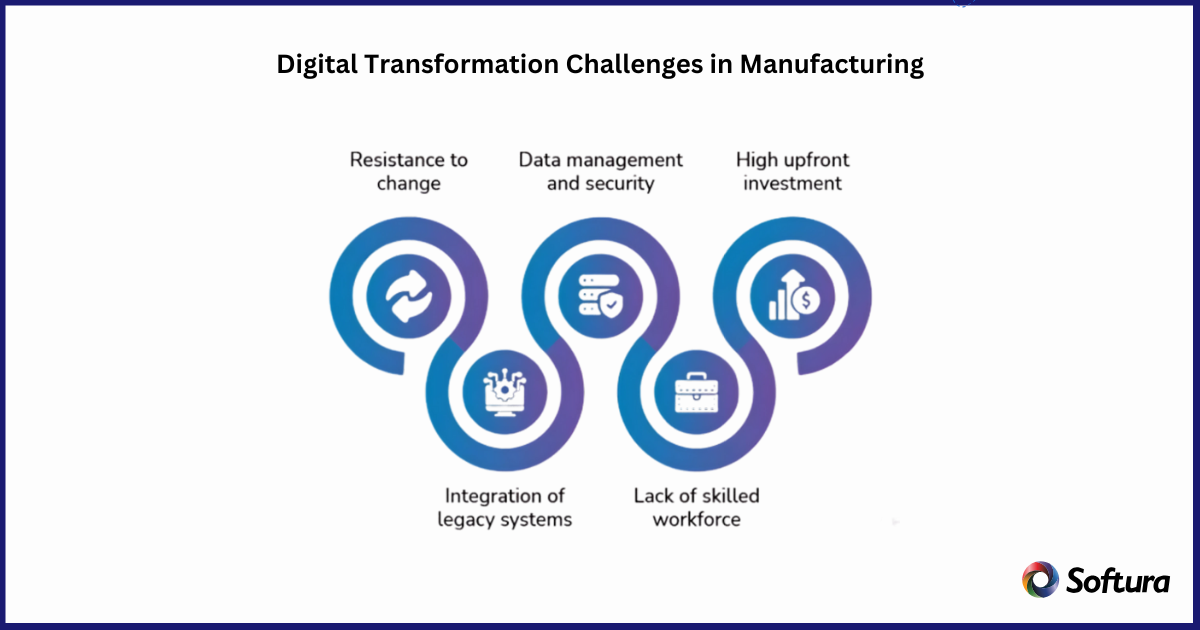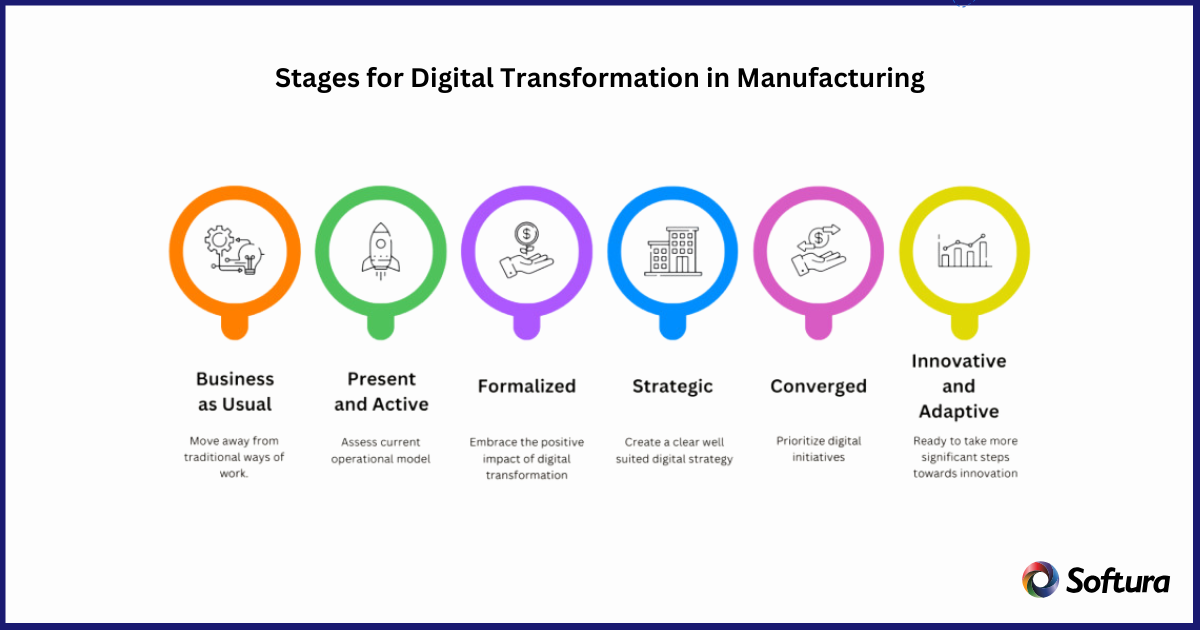"Our integration with the Google Nest smart thermostats through Aidoo Pro represents an unprecedented leap forward for our industry."
- Antonio Mediato, founder and CEO of Airzone.
Can Your Factory Outsmart Its Competitors?
Digital transformation in manufacturing leverages technologies such as artificial intelligence (AI), machine learning (ML), the Internet of Things (IoT), additive manufacturing, and augmented or virtual reality (AR/VR) to revolutionize processes. These tools enable interconnected systems that enhance efficiency, improve product quality, and eliminate operational bottlenecks.
Real-time data insights, predictive maintenance, and optimized workflows empower manufacturers to lead in competitive markets. This blog explores how digital transformation drives precision and scalability. IoT sensors reduce downtime through predictive analytics, while AI optimizes supply chains, ensuring agile and sustainable operations for strategic growth.
The COVID-19 pandemic accelerated digital transformation in manufacturing, necessitating adaptations to address supply chain disruptions, remote work, and new delivery models. This urgency gave rise to Industry 4.0, where intelligent factories utilize cutting-edge technologies to remain competitive.
AI, IoT, 5G, smart robots, digital twins, and AR/VR are revolutionizing the manufacturing industry. Unlike rigid, rule-based systems, these technologies enable real-time data processing via edge and cloud computing, fostering proactive decisions, predictive maintenance, and streamlined production.
AI at the edge minimizes latency, enabling instant anomaly detection. This allows factories to optimize maintenance, monitor quality, and enhance resource allocation, ensuring swift responses to operational challenges.
5G powers robust IoT networks, enabling seamless data collection across factory operations. This enables the rapid reconfiguration of production lines, meeting dynamic customer demands, and enhancing automation.
Smart robots and collaborative cobots adapt to changing conditions, working alongside humans. Digital twins simulate scenarios, optimizing processes like maintenance and risk planning for maximum efficiency.
AR/VR enhances training and operations with real-time feedback, guiding assembly, inspections, and repairs. These tools boost worker expertise and factory performance, reducing errors.
Adopting these technologies ensures manufacturers enhance productivity, sustainability, and quality. By empowering workers for higher-level tasks, intelligent factories gain a competitive advantage in the rapidly evolving Industry 4.0 landscape.
"Our integration with the Google Nest smart thermostats through Aidoo Pro represents an unprecedented leap forward for our industry."
- Antonio Mediato, founder and CEO of Airzone.

Let's discuss a few digital transformation challenges faced in the manufacturing sector -
Selecting adaptable, scalable tools is critical for staying competitive. The challenge lies in identifying technologies that align with long-term business growth and evolve in response to industry demands.
Transitioning from human-centric processes to automated systems is complex. Engaging digital transformation consultants and assessing system requirements can streamline adoption and minimize disruptions.
New technologies require robust onboarding and reskilling programs to support their effective adoption. Specialized training for software and robotic systems ensures proficiency, maximizes ROI and prevents falling behind competitors.
Breaking Down Silos
Organizational silos, misaligned objectives, and poor communication hinder collaboration. Fostering a culture of idea-sharing is essential for seamless digital transformation across the enterprise.
AI, machine learning, IoT, sensors, and 3D printing technologies enhance manufacturing efficiency, reduce costs, and optimize resource utilization. These innovations enable precise control, flexibility, and rapid market adaptation, minimizing waste and boosting competitiveness in a dynamic industry.
"By analyzing the data from our connected lights, devices and systems, our goal is to create additional value for our customers through data-enabled services that unlock new capabilities and experiences."
- Harsh Chitale, leader of Philips Lighting’s Professional Business.
Digital transformation in manufacturing is customized to each organization's unique processes. Below are a few examples of digitalization tailored to inspire industry leaders.
Predictive maintenance tracks equipment health, forecasting when parts need replacement to avoid failures. Using work order software reduces downtime, enhances efficiency, and lowers repair costs in industries such as automotive and pharmaceuticals.
AI and machine learning optimize manufacturing by automating repetitive tasks, enhancing safety, and improving efficiency. They predict trends, refine quality control, and minimize waste with applications such as analyzing customer orders or predicting demand.
Specialized platforms, such as Micro100, enable manufacturers to buy, sell, or exchange CNC machinery and tools. These marketplaces address user adoption challenges with in-app tutorials and guided experiences, reducing cart abandonment and boosting sales.
Smart manufacturing leverages digital technology and automation to streamline production, quality control, and supply chains, providing benefits such as improved scheduling, enhanced inventory planning, faster issue resolution, and cost reduction.
IoT sensors collect data on equipment performance in plants or remote sites, monitoring operations, energy use, inventory, maintenance, and environmental conditions such as temperature and humidity, using sensors for gas, temperature, and pressure.
3D printing revolutionizes manufacturing by creating objects or parts from digital designs with layered materials, driving innovation in product development across various industries.

Digital transformation in manufacturing enables competitiveness, adaptability, and sustainability through the adoption of advanced technologies. This 9-phase process guides manufacturers in strategically implementing digital solutions, ensuring alignment with long-term business goals.
Evaluate Readiness: Assess operations, infrastructure, skills, and culture to identify gaps, aligning teams to establish a foundation for successful digital transformation.
Develop Strategic Plan: Craft a roadmap with defined goals, timelines, budgets, and technology integration strategies to ensure alignment with business objectives.
Test with Pilots: Run pilot programs to validate technologies in controlled environments, refining solutions to build confidence before full-scale implementation.
Train Employees: Provide training and upskilling to equip workers with skills for new digital tools, fostering innovation and enhancing job satisfaction.
Integrate Technology: Utilize AI, automation, and analytics to enhance workflows, reduce errors, and improve cross-departmental coordination.
Scale Operations: Expand proven digital solutions across supply chains, inventory, and production, ensuring compatibility with existing systems for enterprise-wide impact.
Monitor Performance: Leverage real-time data and key performance indicators (KPIs) to optimize production, equipment, and supply chains, thereby minimizing waste and preventing downtime.
Iterate Improvements: Collect feedback from employees and systems to continuously refine processes, ensuring adaptability and sustained digital impact.
Focus on Sustainability: Integrate AI, IoT, and blockchain to reduce emissions, optimize resources, and innovate responsibly, meeting market and environmental demands.
Digital transformation in manufacturing offers immense potential alongside notable challenges. As the industry integrates technologies such as AI, IoT, 3D printing, and blockchain, manufacturers must assess their workforce's preparedness. Are your employees ready to harness these innovations? The effectiveness of your digital transformation hinges on your team's ability to utilize these advanced tools to boost production efficiency, improve quality assurance, and promote sustainability. Contact our experts to guide you on your digital transformation journey.
Transform Manufacturing with Softura!
Reimagine manufacturing with data-driven innovation, predictive maintenance, and agile systems built for scalability and sustainability.
Digital transformation enhances efficiency, product quality, and cost optimization while also boosting flexibility, decision-making, customer experience, innovation, sustainability, and competitiveness.
By automating processes and leveraging IoT, AI, and machine learning, digital transformation streamlines workflows, reduces downtime and enhances resource utilization for cost savings and increased productivity.
Digital transformation involves integrating digital technologies, such as AI, IoT, and automation, into manufacturing processes and supply chain management to enhance efficiency and drive innovation.
Challenges include resistance to change, high implementation costs, integrating legacy systems, and reskilling the workforce, all of which require strategic planning and strong leadership.